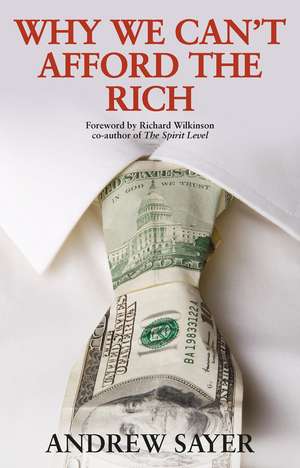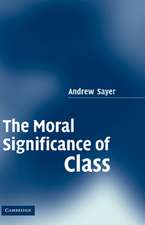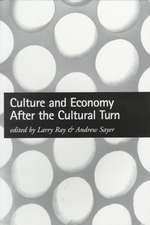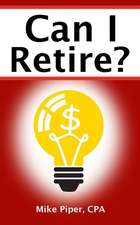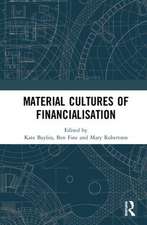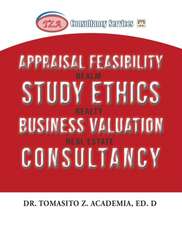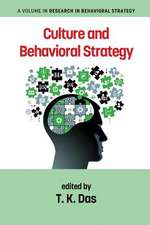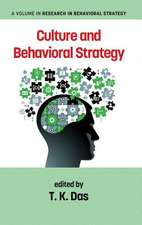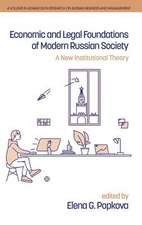Why We Can't Afford the Rich
Autor Andrew Sayer Cuvânt înainte de Richard Wilkinsonen Limba Engleză Paperback – 15 mai 2016
Even as inequalities widen, the effects of austerity deepen, and the consequences of recession linger, in many countries the wealth of the rich has soared. Why We Can’t Afford the Rich exposes the unjust and dysfunctional mechanisms that allow the top 1% to siphon off wealth produced by others through the control of property and money. Leading social scientist Andrew Sayer shows how over the past three decades the rich worldwide have increased their ability to hide their wealth, create indebtedness, and expand their political influence.
Aimed at all engaged citizens, this important and accessible book uses simple distinctions to burst the myth of the rich as especially talented wealth creators. But more than this, as the risk of runaway climate change grows, it shows how the rich are threatening the planet by banking on unsustainable growth. Forcefully arguing that the crises of economy and climate can only be resolved by radical change, Sayer makes clear that we must make economies sustainable, fair, and conducive to well being for all.
Aimed at all engaged citizens, this important and accessible book uses simple distinctions to burst the myth of the rich as especially talented wealth creators. But more than this, as the risk of runaway climate change grows, it shows how the rich are threatening the planet by banking on unsustainable growth. Forcefully arguing that the crises of economy and climate can only be resolved by radical change, Sayer makes clear that we must make economies sustainable, fair, and conducive to well being for all.
| Toate formatele și edițiile | Preț | Express |
|---|---|---|
| Paperback (1) | 84.58 lei 3-5 săpt. | +25.20 lei 6-12 zile |
| Bristol University Press – 15 mai 2016 | 84.58 lei 3-5 săpt. | +25.20 lei 6-12 zile |
| Hardback (1) | 234.03 lei 3-5 săpt. | |
| Bristol University Press – 24 noi 2014 | 234.03 lei 3-5 săpt. |
Preț: 84.58 lei
Nou
Puncte Express: 127
Preț estimativ în valută:
16.18€ • 17.31$ • 13.49£
16.18€ • 17.31$ • 13.49£
Carte disponibilă
Livrare economică 28 martie-11 aprilie
Livrare express 13-19 martie pentru 35.19 lei
Preluare comenzi: 021 569.72.76
Specificații
ISBN-13: 9781447320869
ISBN-10: 1447320867
Pagini: 448
Dimensiuni: 127 x 197 x 38 mm
Greutate: 0.61 kg
Editura: Bristol University Press
Colecția Policy Press
ISBN-10: 1447320867
Pagini: 448
Dimensiuni: 127 x 197 x 38 mm
Greutate: 0.61 kg
Editura: Bristol University Press
Colecția Policy Press
Notă biografică
Andrew Sayer is professor of social theory and political economy at Lancaster University, UK. His books include Radical Political Economy: A Critique, The Moral Significance of Class, and Why Things Matter to People: Social Science, Values and Ethical Life.
Cuprins
Introduction
Part I: A Guide to Wealth Extraction
Slippery Terms and Vital Distinctions
For rent . . . for what?
Interest . . . for what? or We need to talk about usury
Profit from production: or capitalists and rentiers: what’s the difference?
Other ways to skin a cat
Don’t the Rich Create Jobs? – and other objections
Part II: Putting the Rich in Context: What Determines What People Get?
To what do we owe our wealth?: Our dependence on the commons
So what determines pay?
The myth of the level playing field
Part III: How the Rich Got Richer: Their Part in the Crisis
The roots of the crisis
Key winners
Summing up: the crisis and the return of the rentiers
Part IV: Rule by the Rich, for the Rich
Silent power, pol donations lattice of influence
Hiding it
Illegal? + poachers
What about philanthropy?
Plutonomy
Part V: Ill-gotten and Ill-spent: From Consumption to Ill-Being and CO2
Spending it
Global warming trumps everything
Conclusion: back to basics –
what kind of economy do we need?
Part I: A Guide to Wealth Extraction
Slippery Terms and Vital Distinctions
For rent . . . for what?
Interest . . . for what? or We need to talk about usury
Profit from production: or capitalists and rentiers: what’s the difference?
Other ways to skin a cat
Don’t the Rich Create Jobs? – and other objections
Part II: Putting the Rich in Context: What Determines What People Get?
To what do we owe our wealth?: Our dependence on the commons
So what determines pay?
The myth of the level playing field
Part III: How the Rich Got Richer: Their Part in the Crisis
The roots of the crisis
Key winners
Summing up: the crisis and the return of the rentiers
Part IV: Rule by the Rich, for the Rich
Silent power, pol donations lattice of influence
Hiding it
Illegal? + poachers
What about philanthropy?
Plutonomy
Part V: Ill-gotten and Ill-spent: From Consumption to Ill-Being and CO2
Spending it
Global warming trumps everything
Conclusion: back to basics –
what kind of economy do we need?
Recenzii
“Thought-provoking . . . a persuasive examination of the rich, the sources of their wealth, and their impact on the planet and its less fortunate inhabitants. . . . A cogent and thoroughly convincing argument that will enlighten and inform—and may even help instigate the radical changes Sayer puts forth.”
“Although he draws heavily on the work of others, Sayer offers new insights, in the process granting today’s capitalist class—along with the mainstream political parties—very little merit at all. Why We Can’t Afford the Rich adds to the growing body of work that challenges mainstream economic thinking and traditional self-justifications for inequality. It provides an extended catalogue of the multiple and often complex devices used by those with financial and economic power to grab a bigger share of the cake, manipulating the control of assets like land and money, to ‘siphon off wealth that others produce.’”
“Sayer shows how financial markets came to overshadow the traditional industrial economy, exacerbating the depth of the economic crisis and increasing the share of the rich in national wealth in the process. . . . Sayer’s penetrating analysis of asset-based unearned income is a powerful case for socialism, supporting as he does land nationalization and the creation of banks with the remit to lend for productive investment in ethical and environmentally sustainable business. Well worth a read.”
“Bursting with . . . jaw-dropping data, leaving the reader reeling in disbelief and indignation that the global elite ha[s] amassed such obscene fortunes and shows no sign of slowing down in its insatiable appetite for financial and material excess. The author goes beyond the headline-grabbing examples of super-rich extravagance, however, to construct an incisive analysis of the origins and development of capitalist greed. Anybody looking for an understandable but insightful introduction to political economy need look no further.”
“An excellent critique of capitalism as well as a critique of the rich. . . . Presents a nuanced, well-informed vision, which speaks from the perspective of a moral economy. . . . I recommend this book to politicians, people interested in social change, NGOs, academics, and all those people, whether they belong to the 99% or the 1%, who have an inclination to come to a critical understanding of the status quo, and who wish to contribute to a world that sustains us, that is more economically and socially just, and that is ready to receive future generations.”
“Talking about unfairness, savvy egalitarians have always understood, only gets us so far. Count British social scientist Sayer among these savvy egalitarians. . . . Why We Can’t Afford the Rich takes on—and demolishes—the old canards that apologists for grand fortune regularly trot, everything from ‘When did you last get a job from a poor person?’ to ‘You can’t make the poor rich by making the rich poor.’”
“Substantial. . . . Sayer proceeds very systematically with arguments that may be disliked but which are internally coherent, and with facts that are excessively selective at times but not dubious in themselves. Most important, Sayer does not invent economic mechanisms in the way that populists often do, never forgetting that cake-making must come before cake-distribution, even while rejecting each version of the argument that redistribution inhibits growth.”
“Those who own and run the United Kingdom’s privatized or semi-privatized services make stupendous fortunes by investing little and charging much. In Russia and India, oligarchs acquired state assets through firesales. In Mexico, Carlos Slim was granted control of almost all landline and mobile phone services and soon became the world’s richest man. Financialization, as Sayer notes in Why We Can’t Afford the Rich, has had a similar impact. . . . As the poor become poorer and the rich become richer, the rich acquire increasing control over another crucial asset: money. Interest payments, overwhelmingly, are a transfer of money from the poor to the rich. As property prices and the withdrawal of state funding load people with debt (think of the switch from student grants to student loans), the banks and their executives clean up. Sayer argues that the past four decades have been characterized by a transfer of wealth not only from the poor to the rich, but within the ranks of the wealthy: from those who make their money by producing new goods or services to those who make their money by controlling existing assets and harvesting rent, interest, or capital gains. Earned income has been supplanted by unearned income.”
“Engagingly explains how—and why—we have such trouble seeing what the rich are doing. We are the job creators, they insist. But our rich aren’t creating jobs. They’re not creating wealth. They’re extracting wealth from the rest of us.”
“Unmatched in persuasive argument and compelling illustrations, Andrew Sayer shows how the rich and the super-rich are destroying not just the economy but the planet too. Everyone should read Why We Can’t Afford the Rich and spread the word.”
“A refreshing antidote to a public discourse that has allowed the perpetrators of the financial crisis to make massive gains, while the full burden of costs falls on those innocent of its causes. A must-read for all those who want to reverse that injustice and a wake-up call for the rich.”
“Cuts through the hype so often used to defend growing inequality and gets to the core of the problem, with suggestions about where solutions may come from.”
“This timely and important book exposes the pernicious influence of the super rich on our economic and social fabric. It underlines the need for radical action to redistribute wealth, re-balance our economy and tackle inequality. A must read for politicians and policymakers alike.”
“Packed with useful information and insights, this is a useful complement to Thomas Pikkety’s Capital in the Twenty-First Century, and makes a serious challenge to the many claims propagated by rich people and their minions.”
“The value of Sayer’s account lies in his readable and persuasive attack on the idea that the very richest have accumulated their wealth fairly and deserve to be allowed to accumulate more.”
“An excellent book. . . . As Sayer insists . . . , it’s not about envying the rich. That’s trivial and petty. It’s about rising above the sort of society that rewards a tiny fraction of people with sums of money that nobody could possibly hope to spend. Future generations will remember two types of politician. Those who built careers by surrendering to the wealthy one percent, and those who spoke out and took a stand. What should a truly responsible politician do?”
“Sayer's brilliant dissection of where the rich get their wealth from, and how they seek to justify it, ought to be required reading for anyone seeking to understand what is wrong with our problem-filled world. . . . His analysis and critique of the rule of the rich is clear, well researched, and compelling. . . . The book’s explanation of the different sources of unearned income the rich appropriate was a highlight. Sayer takes the reader through income, rent, interest and profit from production, in each case showing how the law, social norms and other things normalize economic injustice. He also offers an incisive point-by-point refutation of arguments that the rich deserve the wealth they supposedly ‘create’ or are ‘due.’”
"This is a powerful book deserving a wide readership."
“This is a quietly angry book, full of facts and figures that show the rich to be a major cause of the inequality that Wilkinson and Pickett revealed in their book The Spirit Level and of the injustice that Danny Dorling described in his book Injustice.”
“Nobody talks anymore about the lack of jobs. If you’re out of work, it’s your own fault. You’re probably a loser. Sayer points out that the word ‘loser’ is a term of abuse rather than compassion. The cheats in our society are not considered the tax evaders or bribers of politicians, but those who must turn to the government for help. . . . Sayer’s proposed remedy is increased taxes on the wealthy, more regulation of the financial industry, and greater participation of employees in business ownership. But most important is concern for the public good and the moral vision to see each of us as part of an interdependent social network.”
"Massive admiration for the delightful eloquence of the author, who guides readers carefully and enlighteningly through political-economic terms, concepts, and theories that can often be, in the hands of other writers, opaque and/or dangerously misleading."
